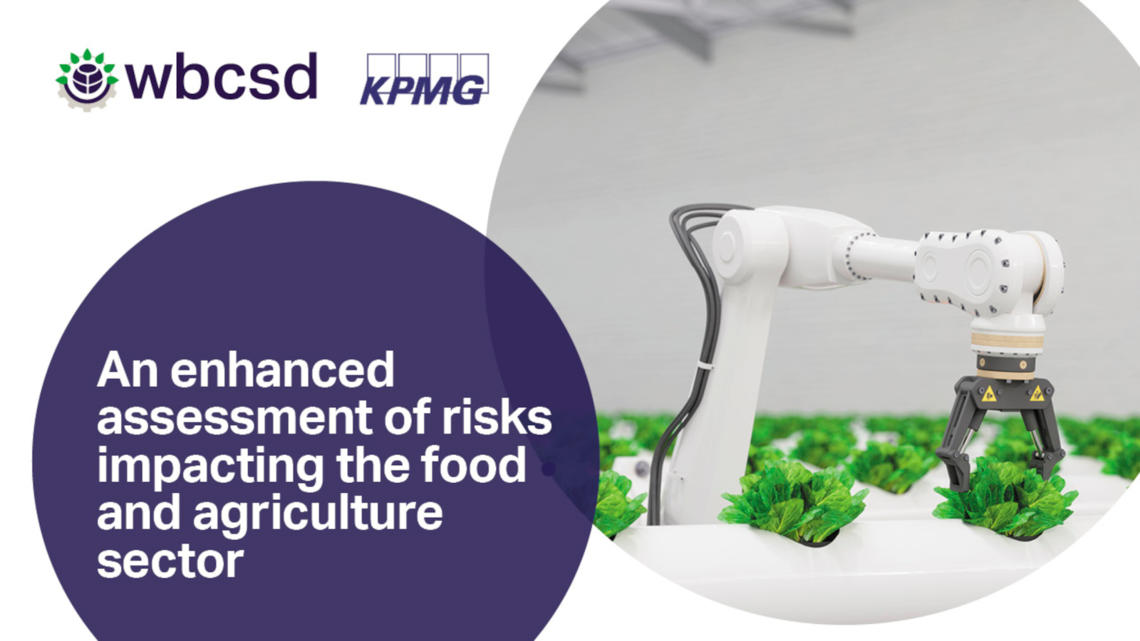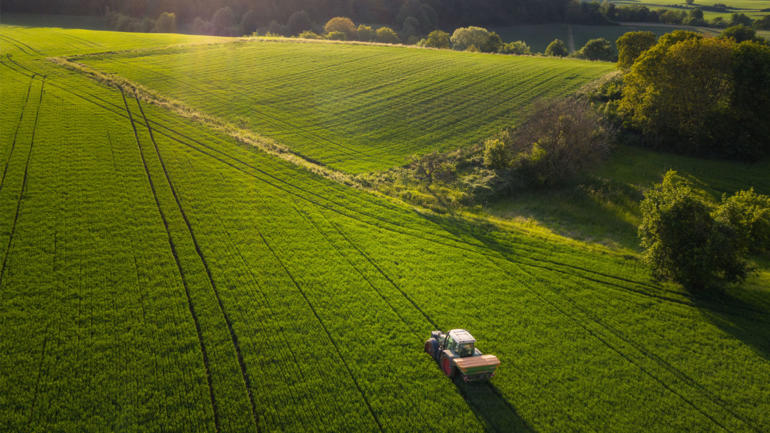Geneva/London, 15 February 2022: Today, the World Business Council for Sustainable Development (WBCSD) and KPMG release An enhanced assessment of risks impacting the food and agriculture sector, which provides updated analysis on new risk dimensions impacting the food and agriculture sector and how companies can best manage these complex, inter-connected risks.
An enhanced assessment of risks impacting the food and agriculture sector presents perspectives founded on insight shared by 12 companies operating in the food and agriculture sector. It presents key clusters of risks associated with the food and agriculture sector, which enables companies to assess how the occurrence of one risk may change the likelihood of a connected risk being triggered. The report also highlights greater severity and speed of onset of risks when viewed as clusters. This enables food and agriculture companies to improve risk management practices by moving beyond traditional approaches that typically focus on impact and likelihood of individual risks.
A network analysis of 20 expert-identified industry risks revealed the following key findings:
- Climate change and episodic events constitutes the risk that determines the overall outcome of the risk network, which makes climate action critical to securing the long-term performance of the food and agriculture system.
- Uneconomical farming is the most impacted and likely risk outcome, and cannot be addressed in isolation. To address uneconomical farming, risk mitigation activities must target a number of different risks that have a positive network impact on other risks.
- Top influential sector risks (i.e., the risks that influence all the other risks in the network) include Food quality & affordability; Disconnect between long-term/short-term interests; and Focus on scale, not diversification.
The report builds on analysis from the 2020 publication to present further analysis from the application of an enhanced risk assessment technique – KPMG’s Dynamic Risk Assessment methodology – to the food and agriculture risk landscape.
The risks associated with the food and agriculture sector are complex, as a key interface between society and the environment. The need to address such risks strategically is reflected in the WBCSD Strategy 2022 – 2027, which identifies food and agriculture as one of six key pathways to transform value chains and solve global sustainability imperatives – climate, nature and equity action – in an interconnected way.
Access the full publication here: www.wbcsd.org/DRAFoodAg
Register to learn more about the report in a webinar with the authors on 2 March 2022: https://wbcsd.secure.force.com/GuestEventPageV2?aId=a5s5p000001LvLl
ENDS
ABOUT WBCSD
WBCSD is the premier global, CEO-led community of over 200 of the world’s leading sustainable businesses working collectively to accelerate the system transformations needed for a net zero, nature positive, and more equitable future.
We do this by engaging executives and sustainability leaders from business and elsewhere to share practical insights on the obstacles and opportunities we currently face in tackling the integrated climate, nature and inequality sustainability challenge; by co-developing “how-to” CEO-guides from these insights; by providing science-based target guidance including standards and protocols; and by developing tools and platforms to help leading businesses in sustainability drive integrated actions to tackle climate, nature and inequality challenges across sectors and geographical regions.
Our member companies come from all business sectors and all major economies, representing a combined revenue of more than USD $8.5 trillion and 19 million employees. Our global network of almost 70 national business councils gives our members unparalleled reach across the globe. Since 1995, WBCSD has been uniquely positioned to work with member companies along and across value chains to deliver impactful business solutions to the most challenging sustainability issues.
Together, we are the leading voice of business for sustainability, united by our vision of a world in which 9+ billion people are living well, within planetary boundaries, by mid-century.
Follow us on Twitter and LinkedIn
ABOUT KPMG
KPMG is a global organization of independent professional services firms providing Audit, Tax and Advisory services. KPMG is the brand under which the member firms of KPMG International Limited (“KPMG International”) operate and provide professional services. “KPMG” is used to refer to individual member firms within the KPMG organization or to one or more member firms collectively.
KPMG firms operate in 145 countries and territories with more than 236,000 partners and employees working in member firms around the world. Each KPMG firm is a legally distinct and separate entity and describes itself as such. Each KPMG member firm is responsible for its own obligations and liabilities.
KPMG International Limited is a private English company limited by guarantee. KPMG International Limited and its related entities do not provide services to clients.
For more detail about our structure, please visit home.kpmg/governance.








